
BECOME A MEMBER
Gain an influential voice in consensus with other experts that will have a real impact on reducing world hunger, improving food safety and nutrition, and supporting new technology applications. Membership is free. Enroll online today! |
GHI LEADERSHIP
Dr.
h.c. Huub Lelieveld
President, Netherlands
Mr. Larry Keener,
Vice-President, USA
Dr. Gerhard Schleining
Treasurer, Austria
Mag. Michaela Pichler
Supervisory Board, Austria
Ms. Nathalie Persson-Andrianasitera
Global Councillor, Sweden
Ms. Adriana Sterian,
MSc.
General Secretary, Netherlands
Dr. Vishweshwaraiah Prakash
Member-at-Large, India
Dr. Sangsuk Oh
Member-at-Large, Korea
Dr. Bernd van der Meulen
Member-at-Large, Netherlands
Dr. Joe Mac. Regenstein
Member-at-Large, USA
Dr. Alina-Ioana Gostin
Ambassador Programme Director, UK
Ms. Adriana Sterian, MSc.
Communications Dir.,Netherlands
Ms. Ana Sanhueza Martín, MSc.
Membership Director, Spain
Ms. Nicole Coutrelis
Regulatory Advisor, France
Dr. Bernd van der Meulen
Legal Advisor - Food, Netherlands
Dr. Siân Astley
Editorial Advisor, UK
Mr. Grigori Badalyan
Librarian, Germany
Mr. Gunter Greil
Webmaster, Austria
Dr. Paul Popescu
Newsletter Editor, Romania
Mr. Alex Surugiu
Graphic Designer/Videographer, Netherlands
Dr. Diana Bogueva
Working Group Coordinator, Australia
|
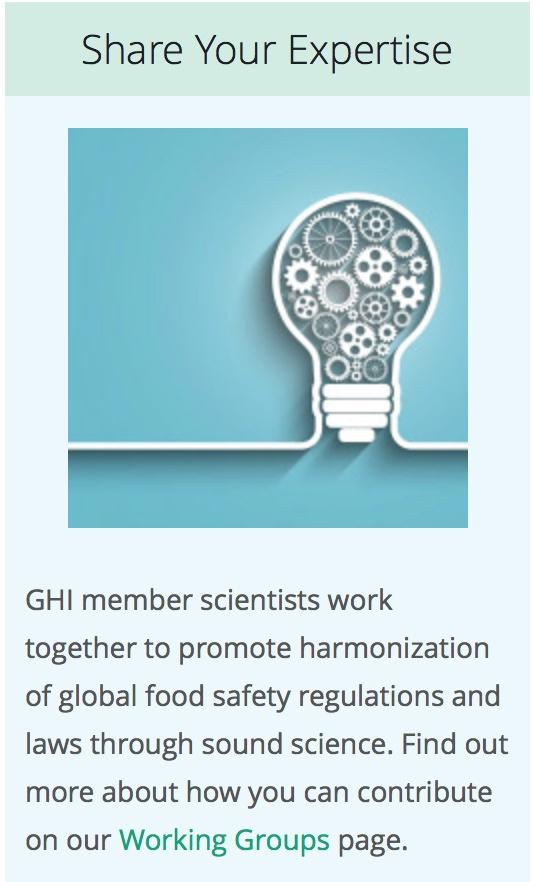 |
GHI SUPERVISORY BOARD
Mag. Michaela Pichler (Chair)
EuCheMS Food Chemistry Division, Graz, Austria
CSIRO, Werribee, Australia
The Ohio State University, Columbus, Ohio, USA
Fuzhou University and Chinese Institute of Food Science and Technology, Fujian, China
Roosevelt Academy, Tilburg,
The Netherlands
EuroFIR, Brussels, Belgium
Universidad Central de Venezuela, Venezuela
Dr. Kwang-Ok Kim
Ewha Womans University, Seoul, Korea
GHI AUDITORS
Dr. Pablo Juliano
Australia
|
|
|
President's message
 Dear Readers, Dear Readers,
The Covid-19 pandemic is not over. It is more severe and more persistent than many expected and nobody knows yet how long it will last and when there will be an ultimate solution, a well working vaccine. The most famous Dutch soccer player, Johan Cruyff, used to say "Every disadvantage has an advantage" and he was right. This also applies to Covid-19. Like most if not all of us, travelling has been reduced dramatically and the time saved that way may be used for matters that have been delayed for too long a time. From the correspondence with the GHI members, I have noticed that many are busier than ever before, because of distant teaching. Other members, however, indeed suddenly had time to catch up with too long postponed duties. The correspondence with members and in particular GHI officers doubled in the past months and so did the number of online meetings, using Skype, Zoom, Facetime and other such technologies. Some members found the time to speed up with their duties, such as writing chapers for the GHI books and becoming more active in working groups.
Most international meetings had to be cancelled, many shortly after announcing them in the previous issue of GHI Matters, including the Food Contamination and Traceability Summit that should have taken place in Munich, Germany, on 26 and 27 May. Many of these meetings were postponed untill half a year later, to be postponed again untill next year. Other meetings were held online. Because of the attempts of many organisers of events to move to 2021, that year will be extremely busy with events and there will be much competition for venues and times. Therefore the Board of GHI decided to postpone the 2nd GHI Congress untill 2022, in principle also including the cancelled Summit.
The 7th of June was the World Food Safety Day. I do not know how this day did or will influence food safety worldwide. GHI's goal is "Achieving consensus on the science of food regulations and legislation to ensure the global availability of safe and wholesome food products for all consumers" and therefore I encourage everybody to continue activities to remove regulatory barriers to the movement of food across the world, that are not based on good scientific evidence. To be successful, everybody needs to understand what food safety means and needs to learn how to distinguish misinformation from correct information. That is why GHI tries to develop teaching materials aimed at improving the understanding of food safety by everybody, at all levels and thus in all languages. I invite our approximately 100 ambassadors but also other GHI members to continue to inform those who need to know. Much material is available and if you cannot find it, you may ask and if not available, we may start developing it.
Hopefully you all remain free from Covid-19 but also from other diseases! Stay alert and do what is needed to prevent the virus from spreading.
Huub Lelieveld.
|
|
 SARS-CoV-2 virus and the Covid-19 pandemic SARS-CoV-2 virus and the Covid-19 pandemic
 Recommendations for food businesses (English) by Lucia Anelich Recommendations for food businesses (English) by Lucia Anelich
Prof. Dr. Lucia Anelich is one of the first food safety experts who produced a very useful presentation about food safety and the Covid-2 virus. Although focussed on South African food handlers, the messages are very clear and - with perhaps a few adaptiations - the presentation is also very suitable for use in other countries. To view the presentatrion, click
here
.
Lucia also participated in the development of the South African position paper "Priority Setting for Interventions in Pre- and Post- Pandemic Management: The Case of COVID-19" that certainly is worth reading for everybody involved in management of the current pandemic and future ones. This document can be downloaded
here
. For more information you may visit Lucia's
website
.
 Recommendations for food businesses (Spanish) by Franco Pedreschi Recommendations for food businesses (Spanish) by Franco Pedreschi
Franco Pedreschi Placencia is a professor at the Pontifica Universidad Catolica de Chili, Departamento de Ingenieria Quimica y Bioprocesos. He and his department contributed to the dedicated webpage "
Soluciones Para Enfrentar Emergencia Covid-19
" (Solutions to Cope with the Covid-19 Emergency). Currently he is working with a team on a video "Efectos del Covid-19 en la Inocuidad Alimentaria: Desafíos para Cadena Agro-Alimentaria en Chile" (Effects of Covid-19 on Food Safety: Challenges for the Agro-Food Chain in Chile). He will announce the availability as soon as the video is ready. If you are interested in receiving such information as soon as possible,
email
Franco.
 Personal message of Vishweshwaraiah Prakash Personal message of Vishweshwaraiah Prakash
The need for boosting immunity through food-based approach in the current context of COVID 19
Vish Prakash, Ph.D.,FRSC.
GHI Board member
India
In the current Context of COVID 19, the world is locked down in most of the places and all major activities and Economic activities are almost at the minimum level. There is a hope that vaccines will come and many companies and Academia are working very hard to have the vaccine available at the earliest. However, due to the nature of protocol well accepted globally we are rather convinced it is not in the near future that the vaccine will be available, but may take about 18 months to 24 months to reach the arm of everybody if we consider that as the fastest. It may be further delayed also. However in this waiting period apart from some of the hygienic protocols like hand washing, mask, and distancing from people outside of Home in public places as per norms have to be followed.
However, at a personal level and family level, there is much more we can do to boost immunity from three different angles of the Food-based approach to protect and prevent infections in general and especially at this time when there is a large spread of the virus load in the society. Some of the approaches are :
(1) NUTRIENTS: to consume foods rich in Vitamin C, Vitamin D, Beta Carotene, Vitamin A, Zinc, Vitamin E, Vitamin B 12, and Iron. The list appears long but one can manage to eat foods in a variety where one can get these in higher amounts and it is good that it draws your attention to ensure higher consumption of these vitamins and minerals to boost one's Immunity. Unless due to medical conditions one has to take tablets or Capsules it is better to have them on a Food-based approach which makes it a very holistic and sustainable approach. You want to select foods that are rich in these Nutritionals based on the geographical area one is living and what is locally available.
(2) FOODS: to consume foods and ingredients and to increase their intake either on a weekly or daily basis is another added extra way to move forward. For example Foods like unpolished rice, whole lentils, soybean, barley, spices like turmeric, ginger, black pepper, cumin, cloves, onion and garlic and Cinnamon; herbal teas based on them, Legumes, Pulses and Millets and Colored Fruits like Papaya, Banana and Citrus fruits and Green Leafy Vegetables have been shown to boost the Immuno Modulatory system from several mechanisms. These are evidence-based Science and Science-based evidence and also traditional foods and wisdom in many countries and regions which today with the use of modern tools of Science the world is deciphering. Over and above this the local Foods in practice must be in place at least once a day so that the Gut Microbiome is healthy especially in these times of needed high immunity. The consumption of these above-mentioned foods has to be in moderation and according to individual constitution and habits and exposure of certain foods to the body may play a major role in their consumption pattern.
(3)ADVISORIES: Exposure to Early morning sunlight, enough sleep and rest, exercising regularly according to age and medical condition, calming the mind through Deep breathing practices to strengthen the lungs, hot food is preferable to cold food and to ensure enough hydration is there throughout the day is also important. Some of these eating habits may depend on local availability of foods and one can recalibrate based on the local Agri production. This also is important from a sustainability point of view and an availability point of view.
SUMMARY: Most importantly, if one cannot Harmonise all the Food regulations currently based on Science for Safety across the globe still at least the Nutrition world brings us into the Harmonisation table together on consensus and let us hope the individual Immunity built in this way enhances the Community Immunity too bringing in better health and Wellness and Protection to groups of people not only against COVID 19 but also against other pathogens in Food, which is based on many studies. As of now, it is clear that COVID 19 is not a Food-Borne Virus. Stay safe, stay healthy, and boost your immunity with any other sources of well-documented information as well that you have come across and finally make a menu that suits you and family in this backdrop of Food Consumption.
Disclaimer:
In case of any symptoms of COVID 19 and other Infections please immediately consult your doctor and these suggestions above cannot be a substitute for medicine. Further, if anybody is allergic to certain foods it is best to avoid them and the person needs to take all precautions before consumption of any of the above Foods. This article does not represent the view of any organization or Institution and is purely based on the author's personal knowledge.
 Personal message of Benard Oloo Personal message of Benard Oloo
Emerging food safety concerns even as we celebrate the World Food Safety Day 2020
Dr. Benard Odhiambo Oloo
Department of Dairy and Food Science and Technology, Egerton University, Egerton, Kenya and GHI Ambassador in Kenya
World Food Safety day was marked on 7th June 2020 under the theme 'Food safety, everyone's business' and aimed to bring food safety onto the public agenda.
There is no better time than now to expand the role of food safety in reducing the burden of foodborne disease illnesses, especially in the developing countries.
There is no evidence to suggest corona virus can be spread through food or packaging materials, but COVID-19 public health measures have disrupted food value chains all over the world
(
Food Security, Information Network, 2020)
. However, this disruption could lead to food safety and quality lapses. Firstly, disruption of transportation and distribution means losses are likely to occur as foods become unfit for consumption. In some cases, delays are caused by trans-border issues and/ or in-country restrictions on movements. In other cases, markets are closed or customer access to markets is otherwise hindered, as is oversight by regulators and monitoring authorities.
Disruption of the world's food value chains has meant that safe, high-quality food imports are restricted in some countries, leaving consumers to rely on short and local food supply chains. In most of the developing world, food for domestic consumption is not under the same scrutiny for safety and quality as imported foods. However, this pandemic has provided an opportunity for developing countries to create and/ or maintain robust food safety management systems at local and regional levels.
Food production and processing are essential, but food production premises have also recorded Covid-19 outbreaks, such as at meat processing units in the United States, where working condition mean social distancing is extraordinarily difficult. Similarly, losing food safety experts due to sickness can disrupt monitoring at many levels across a range of sectors. Thus, there is need for rapid, risk-based assessment of food processing and transport facilities in line public health guidelines for combating the spread of COVID-19.
Some countries are exploring uber-ization of food supply chains, but these innovative approaches come with emerging challenges, such as creating customized food safety management systems and standard operation procedures (SOPs). Most food processing companies have not adopted business continuity management systems (BCMS), which help to minimize disruption. The most affected food business operators are Small and Medium Enterprises (SMEs), which still dominate food value chain globally. Consequently, stakeholders must come together to support continuity of SME operations in supplying safe, high-quality foods to consumers.
Financial support through stimulus packages are vital for many food businesses, both manufacturers and retail. Such packages enable businesses to continue, reduce unemployment, and discourage tendencies to cut down food safety related expenses. Thus, globally, governments, farmers, business operators, consumers, and food safety experts must accept the challenge to work together to ensure that the COVID-19 pandemic does not lead to a food safety lapses (FAO/WHO, 2020), now or in the future. Food safety is and remains everyone's business.
REFERENCES:
Bibi van der Zee, Tom Levitt and Andrew Wasley (2020). No way food safety not compromised': US regulation rollbacks during Covid-19 criticized. The Guardian. Accessed on 21st May, 2020 from: https://www.theguardian.com/environment/2020/apr/20/no-way-food-safety-not-compromised-us-regulatory-roll-backs-during-covid-19-criticised
FAO/WHO. 2020. Food safety, everyone's business. A guide to World Food Safety Day 2020.
Global Network Against Food Crisis and Food security Information Network. (2020). Key Takeaways of the Global Network Against Food Crises on Preventing A Food Catastrophe During the Covid-19 Pandemic, 2.
FAO/WHO. (2020). Measures to Ensure Safe Food Delivery in Community Kitchens Guidelines for Food Handling, Preparation and Distribution During COVID - 19 Maintaining Food Safety And Hygiene In Community Kitchens During COVID -19.
Food Security, Information Network. (2020). Global Report on Food Crises. Accessed on 17th May, 2020 from: https://www.wfp.org/publications/2020-global-report-food-crises
|

Climate change and food safety
Dr. Gerry Moy made us aware of a webpage "
Climate change and food safety
". The page summarises much information about food security and safety as potentially influenced by the climate, very relevant to GHI's goals. The page has been written by emeritus professor Dr. Stefan Fabiansson, formally Professor in Food Safety at the Swedish University of Agricultural Sciences, recent past Head of the Unit for Dietary and Chemical Monitoring at the European Food Safety Authority.
|
|
| |

Invitation of Amin Mousavi
to contribute to a special issue of Food Research International
Dr. Amin Mousavi Khaneghah, one of the GHI Ambassadors in Iran and, currently, with the Department of Food Science, Faculty of Food Engineering, University of Campinas, Sao Paulo, Brazil is serving as Guest Editor for a Special Issue entitled "
Application of new emerging techniques in combination with conventional methods in decontamination of food products: current state, challenges, and perspectives
" to be published in Food Research International (ISSN 0963-9969, Impact Factor: 3.579; 5-Year Impact Factor: 4.18).
Background
Contamination of food products along the production chain is an ongoing concern. Based on scientific evidence, prevention during harvest, post-harvest, processing, storage, and distribution is the most effective strategy, decontamination techniques are also attracting considerable attention.
Decontamination can be carried out using a variety of methods, physical, chemical, and biological. Physical decontamination is one of the oldest techniques and still widely used to physically remove sources of contamination or contaminated parts of a food. Some chemical agents are also deployed to remove or reduce contamination in products, destroying or binding contaminants to aid removal. However, due to concerns about the safety of end products, most chemical decontamination approaches are viewed with some scepticism by consumers. Biological decontamination techniques are, probably, the most environmentally friendly and efficient approaches and have the added benefit of not affecting nutritional and sensory characteristics, such as colour and flavour. These methods can even improve nutritional content of end products by, for example, avoiding heating, which destroys labile compounds (e.g. vitamin C and volatile aromatic flavour compounds).
Cold plasma, ozone, irradiation, enzymatic and bioremediation, and high-pressure technologies for decontamination of food products are important research topics. However, many emerging technologies alone, or in combined with conventional techniques, are still under evaluation. Nevertheless, evidence suggests they have considerable potential to support decontamination and reduce food losses, increasing food chain sustainability and food security.
In this regard, the following will be covered by this Food Research International Special Issue:
- New approaches of emerging technologies in decontamination of food products
- Further improvements in processes by combining techniques
- Combination of thermal and non- thermal techniques in decontamination of food products
- Addressing new challenges for food safety of processed food products
- Increasing the quality of treated products using pre-treatments to define levels of decontamination required
- Establishing standards for processed food products decontamination techniques
For more information click
here
.
|
As you all know, most events of this year have been cancelled or postponed and in many cases it is not clear yet when and how these events will take place. In some cases events have been or will be done online. If you wish to have your event to be endorsed again, please follow the instructions below.
*****
Application for endorsing an event
Organizers of conferences and other events related to food safety and food or nutrient security may apply for GHI endorsement. If endorsement is approved, the Event Organiser may use the GHI logo and GHI will announce the event in GHI Matters, the newsletter of GHI that is published five times a year and on the GHI website
calendar page
. Note that endorsement does not mean that GHI will provide financial support. To obtain endorsement by GHI, the event organiser needs to send an request to the
Events Coordinator
, providing all relevant information, including name, address, website and contact data of the organiser of the event; name, location (venue), website, start date and end date of the event; the goal of the event and a (preliminary) programme. Further details can be found here.
|

The 2nd GHI Congress initially was set for 2021. The Covid-19 pandemic, however, has made us to reconsider the date, because many events that were assumed to take place in 2020 have been rescheduled for 2021 and the interest in participation in congresses will probably still be low in 2021. Although the pandemic may still cause difficulties, depending on the developments and in particular, the availability of a vaccine, it has been decided to hold the 2nd Congress, still in St. Petersburg from Wednesday, 27 untill Friday, 29 April 2022. Hence, we invite you to reserve these dates in your 2022 diary. In the coming months you will gradually find more information on the
2nd GHI Congress website
, but we shall also continue to report the progress in GHI Matters.
|
UNIFood Conference, University of Belgrade, Serbia, 25-26 September 2020
GHI members are invited to participate in this conference, chaired by Prof. Dr. Mirjana Pesic of the Faculty of Agriculture of the University of Belgrade - President of the Scientific Committee and GHI Ambassador in Serbia. For details of this GHI-endorsed conference click
here
.
|

Genetically Modified and Irradiated Food - Controversial Issues: Facts
versus
Perceptions
Edited by Veslemøy Andersen
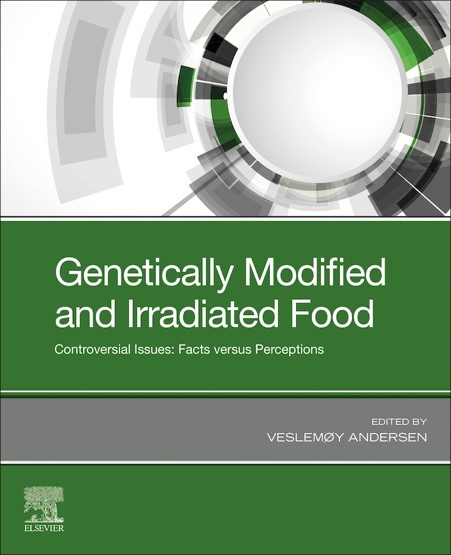
The editor is GHI Ambassador for Norway and also Lead-Editor of the 1st book of the "Nutrition and health aspects of traditional and ethnic foods" series (about the Nordic Countries), of which she is also Series Editor. The book debunks the nonsense published about two of the technologies that are likely to be crucial for mankind to survive with almost 8 billion inhabitants on a small planet. The chapters in the book have been written by renowned experts with the interested non-scientists and scientists in other disciplines in mind. Contrary to many popular books intended to give these technologies a bad name, all chapters have a large number of references enabling readers to check the scientific research underpinning the conclusions of the chapters.
The book was published January 2020. When ordering, use "GHI30" for the 30% discount.
|
|
Books and video on sustainable plant food production
by Margit Olle, GHI Member in Estonia
|
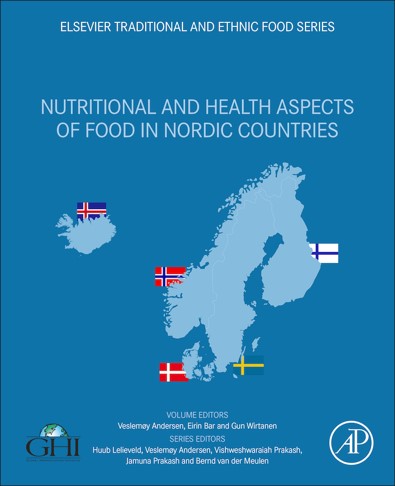
Nutrition and health aspects of traditional and ethnic foods in Nordic Countries
Edited by Veslemøy Andersen, Eirin Bar And Gun Wirtanen, is the first volume of the series of 26 books a
bout the topic, covering the entire globe. This volume discusses the nutrition and health aspects of Norway, Sweden, Denmark, Finland, Iceland as well as Sápmi, also known as Lapland. It is published by Elsevier/Academic Press 2018. ISBN: 978-0-12-809456-3 (eBook) and 9780128094167 (print).
Note that, as with all food science books published by Elsevier, using the code GHI30 gives you a 30% discount.
|

Nutrition and health aspects of traditional and ethnic foods in
Western Europe
Edited by Susanne Braun, Christina Zübert, Dimitrios Argyropoulos and Francisco Javier Casado Hebrard
This volume of the 26 volume-large GHI series was published on 15 October 2019 and can be ordered from the website of Elsevier.
Remember to use GHI30 to obtain a 30% discount.
|
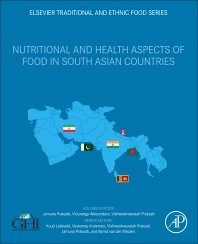
Nutrition and health aspects of traditional and ethnic foods in South Asia
Edited by Jamuna Prakash, Viduranga Waisundara and Vishweshwaraiah Prakash
This GHI book of the same series was published
on 1 March 2020, it can be
ordered
now from Elsevier and remember, by using code GHI30, you will receive a 30% discount.
|
|
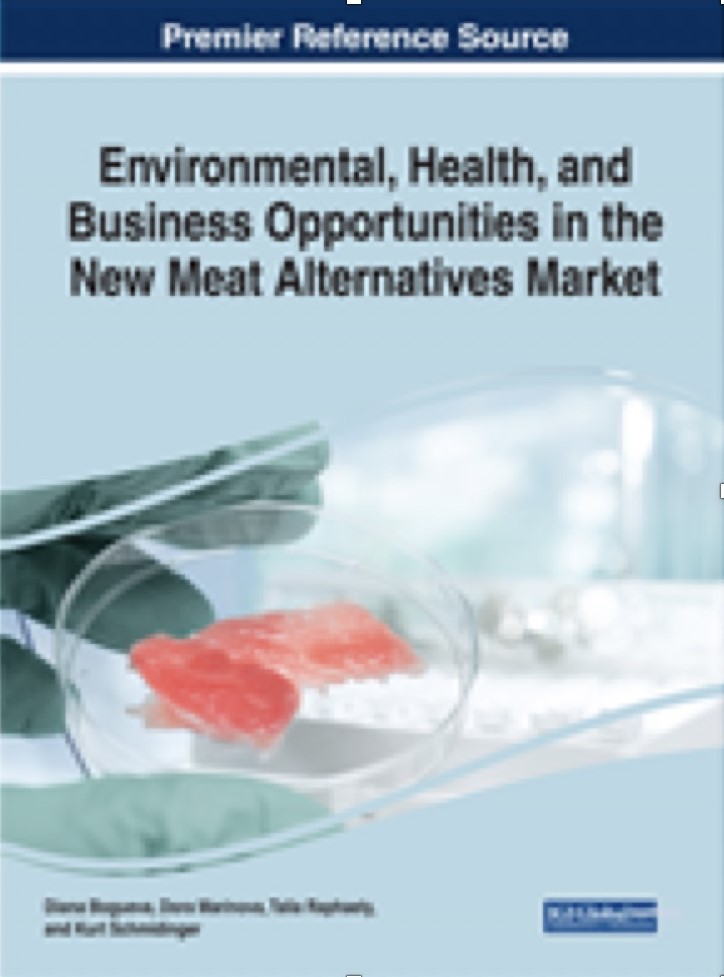
The book
Environment, Health and Business Opportunities in the New Meat
Alternatives Market,
with Lead-Editor GHI Ambassador in Australia, Diana
Bogueva, won not only the 24th Australian Gourmand Award, but now also
the Best in the World Gourmand Award
. These awards are the equivalent of Oscars but for food related books. The
book
is a pivotal reference source that provides vital research on the development of plant-based foods and nutritional outcomes and thus very important for everybody interested in food security. The book is designed for policymakers, economists, health professionals, nutritionists, technology developers, academicians, and graduate-level students. Co-editors are Dora Marinova (Australia), Talia Raphaely (Australia) and Kurt Schmidinger (
Austria
).
Editors, Congratulations with these achievements!
|
Copies of the first two GHI's books are still available:

Ensuring Global Food Safety
- Exploring Global Harmonization.
Edited by
Christine Boisrobert, Aleksandra Stjepanovic, Sangsuk Oh and Huub Lelieveld
Elsevi
er/Academic Press, 2009.
ISBN:
9780123748454 (print) 9780080889306 (eBook)
|

Regulating Safety of Traditional and Ethnic Foods
Edited by Vishweshwaraiah Prakash, Olga Martín-Belloso, Larry Keener, Siân Astley, Susanne Braun, Helena McMahon and Huub Lelieveld
Elsevier/Academic Press, 2015.
ISBN:
9780128006054 (print) 9780128006207 (eBook)
|
|
|
|
|